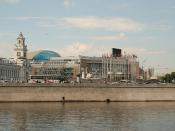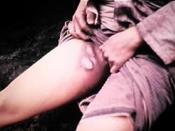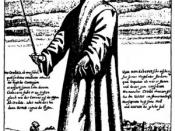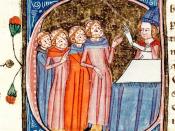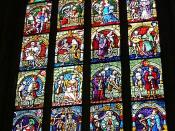ÃÂIf the wonders of nature were to be fully explored for the benefit of man, prejudices and errors of the past would have to be discardedÃÂThe Black Plague was the only event in history that made a noticeable decrease on the human population chart. It installed so much death and fear upon the residents of Europe that it interfered with their normal function. With the religious fervor of the time, the plague made the Europeans believe that God was punishing them for their sins. Added to the severe extent of superstitions and lack of scientific knowledge, this made people go to extreme and bizarre lengths to try to protect themselves from the wrath. When these extreme measures didnÃÂt work, people were faced with the knowledge that nothing could be done to stop the plague, making them face true horror and discontinue their normal routines. This lack of normal function and productivity unsettled virtually every aspect of European society, putting the current social system to shambles.
Christianity dominated the European continent during the centuries of the black plague. Seeing that the religion emphasizes reward for good deeds and punishment for sin, it is no surprise that it was popular belief that the plague was GodÃÂs retribution for wickedness. This is seen in Year of Wonders, where some of the villagers resorted to a cult of self-punishment in an effort to end the plague. We also see examples of turning to religion in Documents 7, 10, and 15 where the writers imply that no ordinary earthly method can protect one from the plague. In Documents 7 and 10, the authors discuss people turning to superstitions, rituals that are not included in the Bible and that were often looked down upon, sometimes even seen as satanic. Specifically in Document 7 we hear the desperation in the writerÃÂs voice. She fed her ailing husband some ÃÂholyÃÂ bread and he got better. She was so overjoyed that she didnÃÂt even think of attributing this ÃÂmiracleÃÂ to anything other than divine intervention. Such stories contributed to the spread of these practices and superstitions. Document 2 discusses how the streets and homes of England were filthy. This is significant because the author insists that this uncleanliness was the original cause of the plague. This shows us that not everyone looked to religion for answers.
Fear was one of the greatest contributors to the decline of society during the plague. A whopping third of the European population died from it. When the rituals failed the inhabitants had to live with the fact that everyone around them was dying and they couldnÃÂt do anything about it. They had to live under the constant threat that they will be the next to get afflicted, the next to die. Document 8 describes just this. Here a housewife talks about her fear of family members dying from the plague. I think itÃÂs interesting that she is listing the people she would ÃÂgive upÃÂ to the disease in order, as though she has a choice. This suggests that she is at the bargaining stage of mourning, even though none of her family has yet been afflicted. This shows that the fear of the disease was almost as terrible as the actual dealing with it. This fear was represented in the way the residents of Europe lived their lives during the greatest outfalls of plague. Document 5 discusses how the afflicted were literally shut inside their own homes. The cities gave up their sense of morality and let the plague victims starve rather rather than increase the chance of further contamination. Documents 12 and 13 discuss how people succumbed to the fear and stopped doing normal tasks, such as traveling and buying wigs. The fear was helped spread by stories of people exploiting the plagueÃÂs effects, such as the one in Document 4, which speaks of heirs spreading plague so their inheritances would come quicker from their now-dying relatives.
During the plague the entire European society seemed to lean towards a more retarded, depressed state. In fear of contamination, people did less outside their homes and interacted with fewer foreigners. This depression is seen in Year of Wonders where the villagers donÃÂt travel to any neighboring town and donÃÂt pursue criminals with public punishments, two activities that they would have never otherwise ceased not occurred. As a result, the economy deteriorated, adding even further damage to the European lives. Documents 1 and 14 discuss how the plague has slowed business. Collectively, they reveal that the plague affected not only businesses including foreign trade (Document 14), but also local ones (Document 1). Document 3 talks of how the poor French working class was hit with the plague more than was the noble class since they couldnÃÂt flee from the afflicted areas. Since by definition, the working class was the one that got most of EuropeÃÂs work done, a heavy hit to them meant a heavy hit to the entire European market.
If ever a natural disaster changed the course of human history, it was the black plague. It spread death to every nook and cranny of the continent, wiping out a significant percentage of its workforce. Those who did not die from it had to live with a depressed economy and lagging government along with a constant fear that they or their loved ones would be the plagueÃÂs next victims.
Bibliography:McKay, . A History of Western Society. Sixth Edition.
